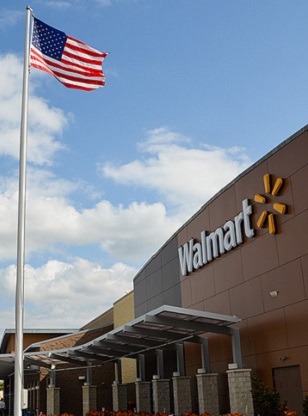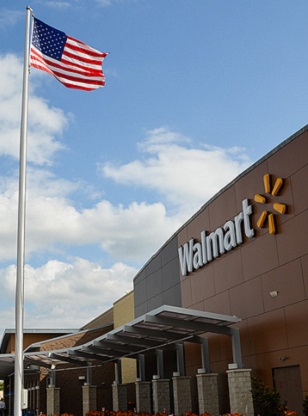 cool revolution / Flickr)” width=”308″ height=”416″ />Walmart’s America. (Photo: cool revolution / Flickr)Controversy around big-box stores like Walmart, Target, Lowes and Home Depot is nothing new, but communities are getting smarter about tackling these corporate giants — sometimes against considerable odds. In Cape Cod and a handful of other areas across the country, the Economic Impact Review is becoming a vital tool for handling development disputes and related issues. The review forces a detailed, thoughtful conversation on the true local economic impact of big-box construction. The result, reports Stacy Mitchell at Grist, can be empowering.
cool revolution / Flickr)” width=”308″ height=”416″ />Walmart’s America. (Photo: cool revolution / Flickr)Controversy around big-box stores like Walmart, Target, Lowes and Home Depot is nothing new, but communities are getting smarter about tackling these corporate giants — sometimes against considerable odds. In Cape Cod and a handful of other areas across the country, the Economic Impact Review is becoming a vital tool for handling development disputes and related issues. The review forces a detailed, thoughtful conversation on the true local economic impact of big-box construction. The result, reports Stacy Mitchell at Grist, can be empowering.
You might think opposition to big-box stores is limited to chichi communities with decided ideas about their look, feel, and “character” as evidenced in communities like California’s Sonoma, which has a long history of very rigid restrictions on development. It turns out, opposition to these stores is about more than whether they look attractive or preserve the historic heritage of a community. Many people are legitimately concerned about the local economy, and unfortunately, development review meetings commonly exclude this vital factor from the conversation.
While planning commissions can meet to discuss environmental impact, adherence to the building code, and a range of other topics, a conversation about the local economic impact may not be part of what’s allowed to take place in deliberations. The Walmarts of the world typically like it that way, because it keeps negative economic impacts from interfering with their profits. Such businesses often argue that they bring jobs and income into the community, when in fact, the opposite appears to be true — at least according to Economic Impact Reviews’ research.
Take Cape Cod, for example, which started integrating local economic issues into development policy in the 1990s. Mitchell notes that the Cape Cod Commission, a collective of 15 towns, has been embroiled in reviews for a new Lowe’s: “In a filing [PDF] with the commission, Lowe’s said the store would create 115 new jobs. But an analysis [PDF] by FXM Associates found that Lowe’s would not be adding to the economy, but rather siphoning off 10 to 20 percent of the sales at dozens of local hardware, lumber, appliance, paint, plumbing, and other stores. Declining revenue would force these retailers to lay off 163 people.”
Think that’s bad? “These threatened jobs pay about 25 percent more on average than Lowe’s does, meaning the store’s arrival would trigger a net decline in household incomes of $3.2 million annually. The drain on the region’s economy is even greater, the analysis notes, if you consider the fact that, unlike competing locally owned retailers, Lowe’s will purchase very little in the way of goods and services from other Cape Cod businesses.”
To look just at the Lowe’s report submitted to the planning commission that would be approving the development, it would seem like a boom for the local economy. But if you drill below the surface, you find that approving the development would actually be bad for local people, businesses and the economy overall.
Numerous cities across the US have considered moratoriums and other crackdowns on big box development, but the Economic Impact Review may be a smarter long-term solution when it comes to sustainable, smart and equitable development. It provides communities with the tools they need to fairly evaluate proposed developments and reject them if they don’t meet community needs. The more ways communities start talking about land use policy and sustainable development, the better. Because these are issues that are only going to grow in the coming years.
Press freedom is under attack
As Trump cracks down on political speech, independent media is increasingly necessary.
Truthout produces reporting you won’t see in the mainstream: journalism from the frontlines of global conflict, interviews with grassroots movement leaders, high-quality legal analysis and more.
Our work is possible thanks to reader support. Help Truthout catalyze change and social justice — make a tax-deductible monthly or one-time donation today.
